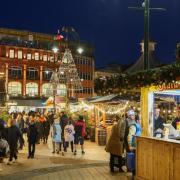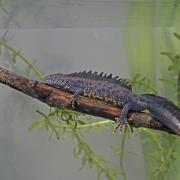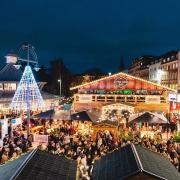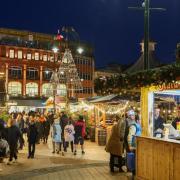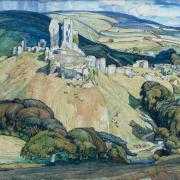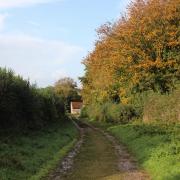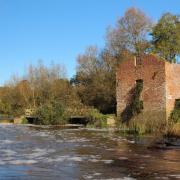Lowland heathlands are not only precious wildlife havens but also lovely places to walk. Here in the UK, we support nearly a fifth of the world’s lowland heathland, 10% of this is in Dorset, and mainly in Purbeck.
As temperatures start to rise, heathland like this is at greater risk of fire. Even in the cooler months there is a risk, especially if heathland has dried out. This is heightened throughout the late spring and summer months with more human recreation as we enjoy better weather.
Most people who visit the heaths are aware of the fire risk and act responsibly to protect this precious landscape. The RSPB does not permit barbeques, campfires, or smoking on any of their Dorset sites. However, it isn’t just these obvious threats that we need visitors to be aware of. A discarded glass bottle, or cigarette end thrown from a car window, can both ignite a heathland fire – all it takes is a single spark. Left unchecked even the tiniest of sparks can quickly turn into a heathland blaze with devastating consequences.

In 2022, Dorset and Wiltshire Fire and Rescue Service (DWFRS) was alerted to a fire at RSPB Stoborough Heath near Wareham. Due to the wind direction that day, flames from a portable barbeque lit on land adjacent to the reserve’s heathland, were blown onto a nearby hedge which caught light before igniting the heath itself. Over a hectare of biodiverse heathland and its resident wildlife was destroyed. Nearly two years on the still charred earth and vegetation are a stark reminder of how long it takes for heathland to recover from fire.
Sometimes people arrive at RSPB Arne via the water, by kayak, paddleboard, yacht and tender. The risk of heathland fire is still very high even on the shoreline which is why beach fires are also prohibited. Last year DWFRS put out a small fire caused by a spark from a beach campfire, which was blown to the adjacent bank vegetation and quickly spread. On this occasion the rapid response from the emergency services meant it was contained.
‘Wildfires can ravage the local wildlife, destroying ecosystems in a matter of hours,’ said Charlie Pack of Dorset and Wiltshire Fire and Rescue Service. ‘Every heath fire starts with human intervention, whether that’s carelessness or a deliberate act. So, we need everyone who enjoys our beautiful open spaces to work with us to help protect them.’

Fires on Dorset’s heathland have also been accidentally caused by people who believe they have acted responsibly, ensuring campfire flames have been visibly put out after use. However, unbeknownst to them the fire has travelled below the ground’s surface. There have also been incidents of people covering campfire embers on Arne beach with sand, then a gust of wind blows the sand cover off and the fire reignites.
‘Residual heat and embers can cause hidden smouldering fires underground, sometimes for a number of days, before spreading to surface vegetation,’ Charlie explained. ‘These unseen fires are particularly challenging for firefighters to detect and can easily spread unnoticed. It’s another reason that we ask people to #BringAPicnicNotABBQ.’
We would echo this and encourage visitors to either purchase a takeaway picnic from our RSPB Arne café or bring their own pre-prepared food from home. There are plenty of benches throughout the reserve, offering stunning views across the heathland, which are perfect for enjoying a picnic. But please – no barbecues or campfires.
We want to thank Dorset & Wiltshire Fire and Rescue Service - without their tireless work and swift action we wouldn’t have our special Dorset heathlands for everyone to enjoy safely. If you do see a fire in the countryside, report it immediately to the Fire & Rescue Service. Early detection can prevent it from developing into a large wildfire. Apps like What3Words can help with accurate location of the fire.

Experience the Dawn Chorus
May is a beautiful time to visit any of the RSPB’s Dorset reserves, especially as birds will be in full voice, defending their territory or attracting a mate. At RSPB Garston Wood, near Sixpenny Handley on the eastern edge of the county, immerse yourself in a cacophony of early morning birdsong as you admire the thick carpet of fragrant bluebells that covers the woodland floor.
At RSPB Arne on the edge of Poole Harbour (featured in the recent BBC Watches television series) the whole reserve is alive with spring sounds and colours at this time of year. If you haven’t yet experienced the dawn chorus, natures very own avian symphony, then make this the year that you do. I like to sit quietly, allowing the multitude of bird’s songs to wash over me, as the dappled light of sunrise permeates the woodland canopy. The dawn chorus is such an enriching experience – real food for the soul.
It isn’t just restricted to woodland. On Arne’s heathland trails you can also hear early morning birdsong. Listen for the stonechat’s distinctive call – it sounds like two stones being clacked together. Look out for the distinctive Dartford warbler, a small grey long-tailed bird with russet chest and red-ringed eyes, as they flit across the gorse and heather, calling in erratic bursts. As the sun warms the ground, look for bare spots in the heathland where one of the six native reptile species that live here may be basking in the early morning rays. Stay on the paths to ensure you don’t disturb the reptiles, insects and heathland birds, many of which are ground nesting.




